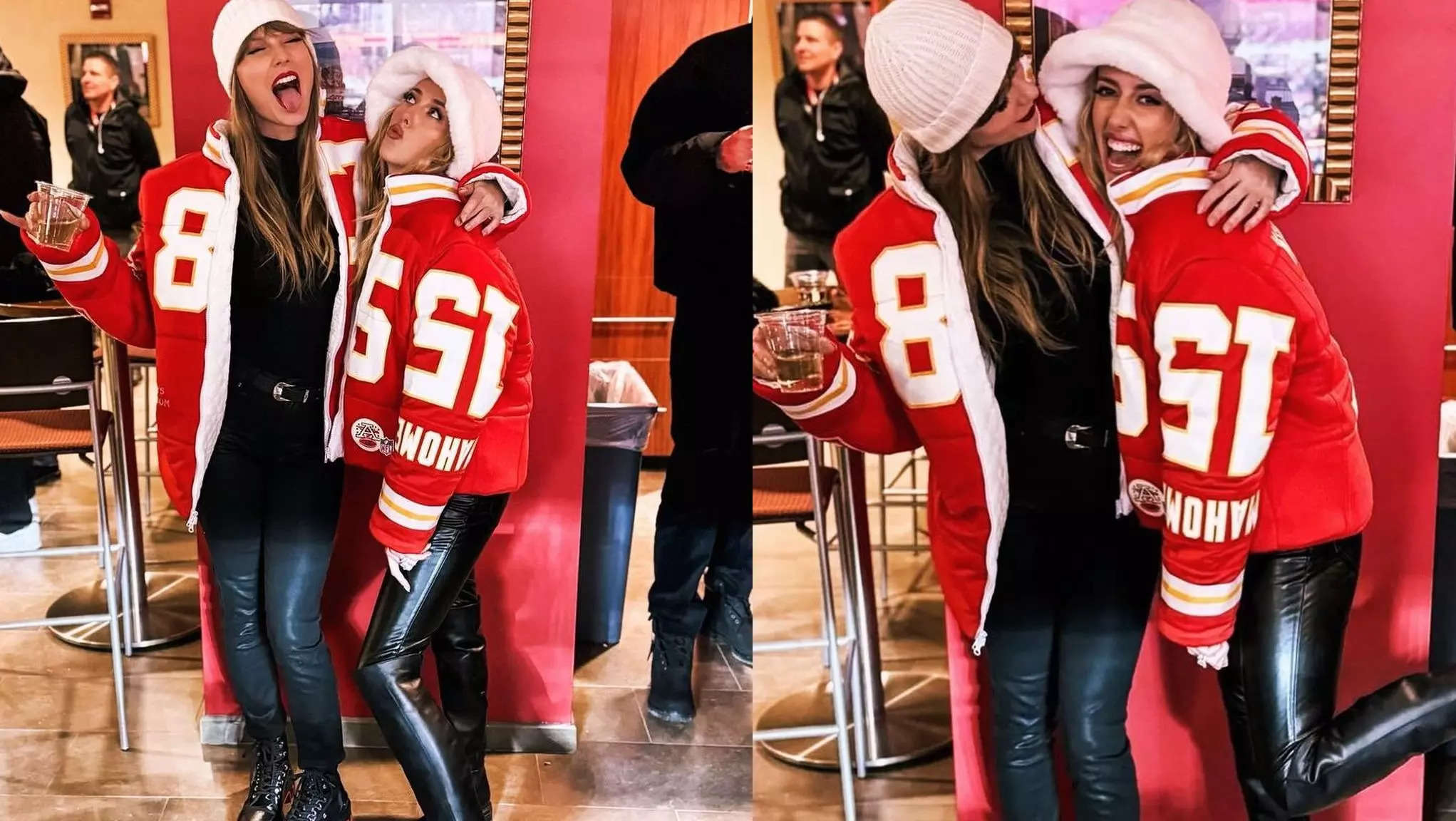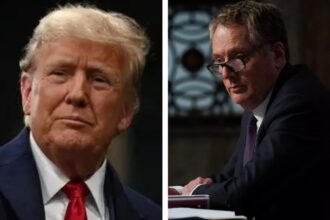Brittany Mahomes, primarily known as the wife of Kansas City Chiefs quarterback Patrick Mahomes, recently found herself at the centre of a political controversy that has resonated far beyond the realm of sports. The stir began when she liked, and then unliked, an Instagram post from former President Donald Trump outlining his 2024 campaign platform. This seemingly small action has sparked a much larger conversation due to Mahomes’s association with pop superstar Taylor Swift, turning her social media activity into a pop culture phenomenon.
Ordinarily, Brittany Mahomes’s political preferences wouldn’t attract much attention. However, her perceived support for Trump, particularly given her connection to Swift—currently one of the most influential figures in entertainment—has made this situation a topic of widespread discussion.
The Trump post in question featured pledges to “seal the border,” “keep men OUT of women’s sports,” and “carry out the largest deportation operation in American history,” among other policies. Social media users quickly noticed Mahomes’s interaction with the post, leading to speculation about her political views.
When confronted with the backlash, Mahomes responded through an Instagram Story, implying that her critics were driven by unresolved personal issues rather than genuine political disagreement. She later shared a post emphasizing the importance of respecting differing views, but the damage was done—her actions were widely interpreted as tacit support for Trump’s platform. This situation is further complicated by the fact that her husband, Patrick Mahomes, who is biracial, has publicly supported movements like Black Lives Matter and spoken out against police brutality. The contrast between Brittany’s perceived stance and Patrick’s public image has added layers of complexity to the controversy.
What makes this situation particularly awkward is Brittany Mahomes’s friendship with Taylor Swift, whose political beliefs are well known. Swift broke her long-held silence on politics in 2018, endorsing Democratic candidates and speaking out on issues such as women’s rights, LGBTQ+ rights, and racial equality. This marked a significant departure from her previously neutral public persona and positioned her as a prominent voice against Trump’s policies. Her activism continued into the 2020 presidential election when she endorsed Joe Biden and Kamala Harris.
Despite Swift’s clear political stance, her fanbase is not monolithic. A small but vocal group known as “Swifties for Trump” has emerged, demonstrating how political polarization can infiltrate even the most seemingly unified communities. This group argues that Trump’s leadership could provide stability, a view that sharply contrasts with Swift’s own liberal leanings. Meanwhile, former President Trump has also sought to garner Swift’s endorsement, even resorting to posting a doctored image on his social media platform, Truth Social.
Conversely, another faction, “Swifties4Kamala,” actively supports Vice President Kamala Harris. This group leverages Swift-themed content to promote political engagement and counter conservative agendas.
Taylor Swift has not endorsed any candidate for the 2024 election, which has left a void that fan groups like Swifties4Kamala and Swifties for Trump are attempting to fill. This dynamic highlights the complex interplay between celebrity influence and political activism, where the actions of public figures can have unexpected consequences. Swift’s relationship with Kansas City Chiefs player Travis Kelce, who has his own connections to Brittany Mahomes, adds another layer to this already intricate narrative.
The Democratic campaign, particularly Kamala Harris’s, has been eager to align itself with Swift’s influence. Recently, a virtual event titled “Swifties for Kamala” featured political heavyweights like Senators Elizabeth Warren and Kirsten Gillibrand, along with singer-songwriter Carole King, to rally support for Harris. The event, which drew around 15,000 participants and raised over $113,000, was another example of how digital organizing can effectively mobilize supporters and generate significant financial backing. While Swift herself was not involved in the event, the organizers made it clear that she was “always welcome.”
Swift has largely refrained from making direct political statements this election cycle, though her past actions suggest she might become more vocal as the election draws closer. Last year, she encouraged voter registration, leading to a significant increase in new registrations, demonstrating her continued influence in political circles.
The intersection of Swift’s personal and public life with her political engagement, coupled with her connections to figures like Brittany Mahomes, creates a unique tension in the “Swiftverse.”
While Brittany Mahomes’s actions might not carry significant political weight independently, her proximity to Swift and the complexities surrounding her husband’s identity make her social media activity a notable point of contention. This incident underscores how closely intertwined celebrity culture and political activism have become, where even a seemingly minor social media action can ripple into a larger cultural moment.
Ordinarily, Brittany Mahomes’s political preferences wouldn’t attract much attention. However, her perceived support for Trump, particularly given her connection to Swift—currently one of the most influential figures in entertainment—has made this situation a topic of widespread discussion.
The Trump post in question featured pledges to “seal the border,” “keep men OUT of women’s sports,” and “carry out the largest deportation operation in American history,” among other policies. Social media users quickly noticed Mahomes’s interaction with the post, leading to speculation about her political views.
When confronted with the backlash, Mahomes responded through an Instagram Story, implying that her critics were driven by unresolved personal issues rather than genuine political disagreement. She later shared a post emphasizing the importance of respecting differing views, but the damage was done—her actions were widely interpreted as tacit support for Trump’s platform. This situation is further complicated by the fact that her husband, Patrick Mahomes, who is biracial, has publicly supported movements like Black Lives Matter and spoken out against police brutality. The contrast between Brittany’s perceived stance and Patrick’s public image has added layers of complexity to the controversy.
What makes this situation particularly awkward is Brittany Mahomes’s friendship with Taylor Swift, whose political beliefs are well known. Swift broke her long-held silence on politics in 2018, endorsing Democratic candidates and speaking out on issues such as women’s rights, LGBTQ+ rights, and racial equality. This marked a significant departure from her previously neutral public persona and positioned her as a prominent voice against Trump’s policies. Her activism continued into the 2020 presidential election when she endorsed Joe Biden and Kamala Harris.
Despite Swift’s clear political stance, her fanbase is not monolithic. A small but vocal group known as “Swifties for Trump” has emerged, demonstrating how political polarization can infiltrate even the most seemingly unified communities. This group argues that Trump’s leadership could provide stability, a view that sharply contrasts with Swift’s own liberal leanings. Meanwhile, former President Trump has also sought to garner Swift’s endorsement, even resorting to posting a doctored image on his social media platform, Truth Social.
Conversely, another faction, “Swifties4Kamala,” actively supports Vice President Kamala Harris. This group leverages Swift-themed content to promote political engagement and counter conservative agendas.
Taylor Swift has not endorsed any candidate for the 2024 election, which has left a void that fan groups like Swifties4Kamala and Swifties for Trump are attempting to fill. This dynamic highlights the complex interplay between celebrity influence and political activism, where the actions of public figures can have unexpected consequences. Swift’s relationship with Kansas City Chiefs player Travis Kelce, who has his own connections to Brittany Mahomes, adds another layer to this already intricate narrative.
The Democratic campaign, particularly Kamala Harris’s, has been eager to align itself with Swift’s influence. Recently, a virtual event titled “Swifties for Kamala” featured political heavyweights like Senators Elizabeth Warren and Kirsten Gillibrand, along with singer-songwriter Carole King, to rally support for Harris. The event, which drew around 15,000 participants and raised over $113,000, was another example of how digital organizing can effectively mobilize supporters and generate significant financial backing. While Swift herself was not involved in the event, the organizers made it clear that she was “always welcome.”
Swift has largely refrained from making direct political statements this election cycle, though her past actions suggest she might become more vocal as the election draws closer. Last year, she encouraged voter registration, leading to a significant increase in new registrations, demonstrating her continued influence in political circles.
The intersection of Swift’s personal and public life with her political engagement, coupled with her connections to figures like Brittany Mahomes, creates a unique tension in the “Swiftverse.”
While Brittany Mahomes’s actions might not carry significant political weight independently, her proximity to Swift and the complexities surrounding her husband’s identity make her social media activity a notable point of contention. This incident underscores how closely intertwined celebrity culture and political activism have become, where even a seemingly minor social media action can ripple into a larger cultural moment.
Source : Times of India









